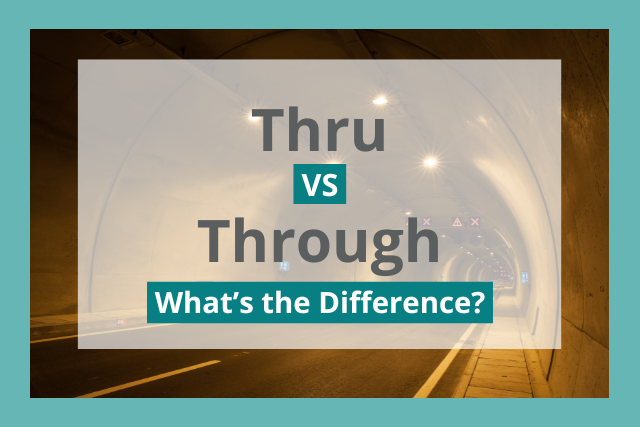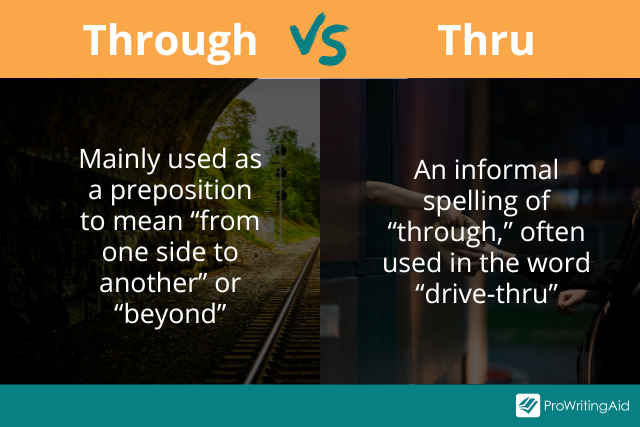
The words thru vs through have evolved through the years. Both words mean the same thing, but thru is a more modern spelling.
Through should be used in formal writing, while thru is more appropriate in informal writing and when referring to “drive-thru” windows at restaurants or businesses.
In this article, we’ll discuss the difference between thru and through, their definitions, and how to use them in sentences.
What’s the Difference Between Thru vs Through?
Through and thru are often used interchangeably. They both mean the same thing; however, thru is more suitable for informal use, while through is the go-to for formal writing.
If you’re sending a text to your friend or making a post on Facebook, then you can use thru. But if you’re writing a cover letter or turning in an essay, we suggest sticking to through.

Thru Definition and Meaning
Thru is non-standard spelling for through that has become more acceptable over time.
When Is It Okay to Use This Abbreviation?
If you’re going to use thru, it’s best to keep it in casual settings, like texting your friends. Avoid using it in your professional and academic writings.
We also use thru when referring to drive-thru windows at restaurants or other businesses. In some cases, we can see thru on traffic signs.
Through Definition and Meaning
Through can be an adjective, a preposition, and an adverb. In all of these functions, it essentially means “from one end to another.”
When used as a preposition, through means “from one side of a person or thing to another,” “past a stage or barrier,” “because of,” or “from beginning to end.”
Let's look at a few examples of each of these meanings:
1) Movement from one side of a person or thing to another.
- The bullet pierced through her left leg.
- The thief entered through the broken window upstairs.
2) Past a stage or barrier
- Now that I’m through with exams, I can finally breathe a sigh of relief.
- He wouldn’t have gotten through the ordeal without the support of his mother.
3) Because of, by way or means of.
- Through hard work and perseverance, the final year med students managed to pass their last exams.
- There were rumors that the new hire got the job through his uncle.
4) From the beginning to the end of an activity, a situation, or a period of time
- They were pleasantly surprised that the baby slept straight through the night.
- The dentist’s office is open Monday through Friday.
When used as an adverb, through means “to completion,” “over an entire distance,” and “in at one end and through the other.”
Here are some example sentences of each meaning.
1) Completion, as it relates to an accomplishment or along the extent of something
- I’ll see the project through since we’ve come this far already
- He wanted to see the trip through, even though the last few days were disappointing.
2) Over an entire distance
- The bus travels from New Jersey through to New York.
- It snowed heavily, but we made it through.
3) In at one end and through the other
- The nail went through the board completely.
- Let these people get through, please.
When used as an adjective, through describes “something that is done or finished,” or “an item going from a point of origin to a destination without change.” Here are a few examples of how this looks in a sentence.
- Greg is almost through with his studies
- Britain’s longest through train journey is 685 miles.
Examples of Through Used in Sentences
Here are some examples of through used in famous literature works. Do you recognize any of these quotes?
“In one word, Queequeg, said I, rather digressively; hell is an idea first born on an undigested apple-dumpling; and since then perpetuated through the hereditary dyspepsias nurtured by Ramadans.”—Herman Melville, Moby Dick
“I’m just going through a phase right now. Everybody goes through phases and all, don’t they?”—J.D Salinger, Catcher in the Rye
“Through all my punishments, disgraces, fasts and vigils, and other penitential performances, I had nursed this assurance; and to my communing so much with it, in a solitary and unprotected way, I in great part refer the fact that I was morally timid and very sensitive.”—Charles Dickens, Great Expectations
Examples of Thru Used in Sentences
Here are a few examples of thru being used in a sentence. Always remember that you should avoid it in formal writings.
- Tell your friend to come thru the side door.
- The Wendy’s drive-thru was closed down.
- There’s a no-thru sign coming up on our left.
Conclusion on Through vs Thru
Let’s sum up what we’ve learned.
Through is the official spelling and means “from one end or side of something to the other.” It mainly functions as a preposition, but can be used as an adjective and an adverb.
Thru is an alternate spelling for through that should only be used in informal contexts. You can check your spelling and consistency with ProWritingAid’s grammar checker.

